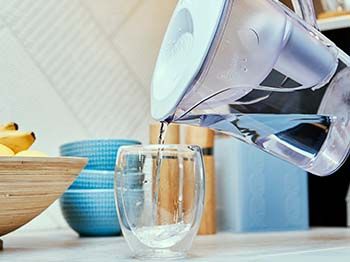How Much Water Should a Senior Citizen Drink per Day?
Article written by Rhianna DeVries - bio in Editorial Team.
We have all heard it… "drink eight glasses of water per day"! As it turns out, that that claim has no scientific evidence to back it up. Drinking fluids throughout the day keeps our bodies hydrated and running optimally, but how much water should a senior citizen drink every day? Below we detail the intricacies of daily water intake for senior citizens.
Is 64 oz Of Water Per Day Enough?
The daily amount of water a senior should drink daily depends on body weight, age, medication use, and fitness and activity levels. In general, a good rule is to divide your weight in half to calculate daily water intake by ounces, according to The Daily Meal. For example, if you weigh 160 pounds, the appropriate amount of water is 80 ounces of water per day. A cup holds 8oz, which equates to 10 cups of water per day. On average, senior citizens need 7 hours of sleep, which means you are awake 17 hours of the day. That equates to about a cup of water every hour and a half of awake time.
Daily Water Intake Chart by Weight
| Pounds | Ounces of Water per Day | Number of Cups Daily |
| 100lbs | 50oz | 6.25 Cups |
| 120lbs | 60oz | 7.5 Cups |
| 140lbs | 70oz | 8.75 Cups |
| 160lbs | 80oz | 10 Cups |
| 180lbs | 90oz | 11.25 Cups |
| 200lbs | 100oz | 12.5 Cups |
| 220lbs | 110oz | 13.75 Cups |
| 240lbs | 120oz | 15 Cups |
| 260lbs | 130oz | 16.25 Cups |
It is important to consider another key factor when calculating a senior's daily water intake. As we age, our water content decreases. According to Healthline, the amount of fluid in our body begins to decrease, meaning fewer water reserves are in our body. The water reduction is caused by wear-and-tear on the kidneys, and as kidney function declines, so does our ability to retain water.
How Often Should You Drink Water?
Our bodies lose up to 2 or 3 quarts of water daily, and this amount must be restored to maintain the proper functioning of our bodily systems. Be sure to optimize consumption by drinking fluids at prime times of the day. Drinking a glass of water first thing in the morning helps flush out the waste your kidneys filtered overnight, according to Drink Hydrant. Having a glass of water before meals can assist with digestion and prep the mouth and stomach for foods by moistening the organs beforehand. And, of course, drinking water after exercise ensures that you replenish lost water through sweat.
Tips For Drinking More Water As We age
Making a habit of drinking water consistently throughout the day can be a little tricky. One tip is to make the water itself a little tastier and more exciting by adding sliced fruits and sugar-free flavor enhancers, which can, in turn, make you more interested in drinking it. Also, be sure to keep a water bottle or cup nearby as a reminder to take sips throughout the day, as well as a pitcher in the refrigerator for a quick refill. You can also make up for a portion of your daily intake by eating fruits and veggies with high water content, such as zucchini, cucumber, tomatoes, celery, strawberries, cantaloupe, and oranges, among others. Try eating soup as an appetizer or main course several times per week. Ultimately, you can find the ways that work best for you by trying different strategies to staying hydrated.
Dangers Of Dehydration Among The Elderly
Our kidneys are the primary organ responsible for processing fluids efficiently. Due to decreased kidney function as we age, seniors are more prone to going to the bathroom more frequently, resulting in less fluid retention. Additionally, certain medications such as diuretics, laxatives, and chemotherapy drugs, can cause increased dehydration. According to Georgetown University, three-quarters of people ages 50-64 take prescription drugs, and a staggering 91 percent of people ages 80 and older.
Due to the above factors, the danger of dehydration among seniors is a real threat. Common health implications resulting from dehydration include dizziness, fainting, constipation, confusion and disorientation, and a drop in blood pressure.
Why You Should Get A Water Filter
The quality of water plays a huge role in our health and well-being. The water we drink, bathe in, and use for cooking needs to be of the highest purity. A good way to ensure the quality of water is by using a purification system that filters out any sediment or impurities. Most of the substances removed from drinking water are dissolved gases, minerals like lead and nitrates, bacteria, and other organic material. Your choice largely depends on your budget and the level of contaminants in the local tap water supply. Here is a wonderful article on how to choose a water filter, including some of the best options on the market today.




